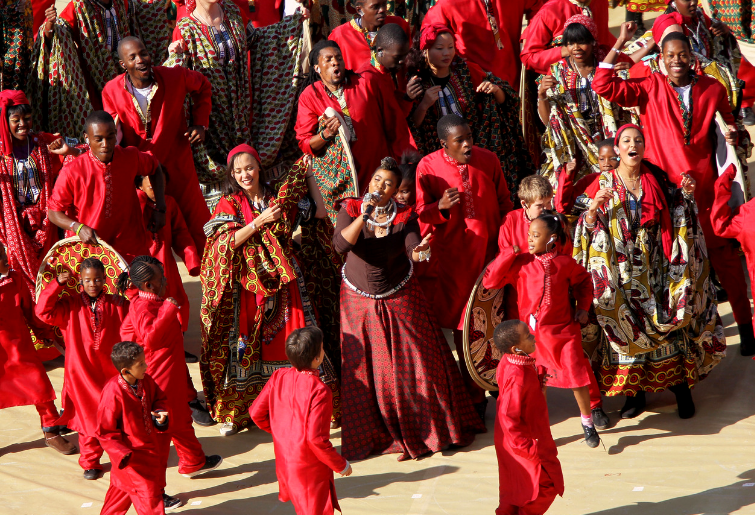
Music
black utopia: songs in the dna of a young democracy
There’s this thing that happens when Black people congregate. It’s an unexplainable force of familiarity and community that is only enhanced by the presence of music. It’s like one of the most potent stimulants for Black creativity and when you throw our natural flair for exhibition and artistry into the mix, utopias get born on sticky dancefloors, in and around car stereos and anywhere a speaker can be heard. Music has always played a part in easing political strife as a tool for creating awareness during Black struggles so bearing witness to cultural impact when bringing communities together is watching the magic of Black Utopianism at work.
Brenda Fassie (MaBrr for short) was one of the first Black female pop stars South Africa knew thanks to her hit ‘Weekend Special’ by her band Brenda And The Big Dudes. Her solo hit ‘Vulindlela’ was one of the early iterations of kwaito-influenced pop. She was the definition of anti-apartheid Afro-pop and her domination of the genre had her filling stadiums in 1985. Time Magazine called Fassie ‘The Madonna of the Townships’ but her unapologetic brazenness makes her more of a South African love child of Eartha Kitt and Grace Jones. Her energy was infectious and her demeanor bold, which can only be expected from someone singing about being a weekend booty-call in the early 80s. She was the free-spirited cultural touchstone for youth culture in the nascent stages of a young democracy,

SOUTH AFRICA – JANUARY 16: Brenda Fassie on stage on January 16, 1985. (Photo by Gallo Images / Sunday Times / Joe Sefale)
If Fassie was the pop star, then TKZee was one of the first South African boy bands to doll out hit after hit. Tokollo Tshabalala, Kabelo Mabalane, and Zwai Bala first ventured onto the charts with “Shibobo,” which sampled “The Final Countdown” and was created in the run-up to the 1998 World Cup. The song became the fastest and biggest selling single by a South African recording artist in history, garnering enough attention to make TKZee household names across the African continent. Their song “Fiasco” was a latin-inspired hit that ushered in the era of summer songs in South Africa. It didn’t do the same numbers as “Shibobo” but it was fun and the fusion of genres spoke to a freedom to experiment that South African musicians were leaning into at the turn of the century.
This creatively fertile environment ushered in a kwaito boom in the late 90s that gave South Africa some of its most legendary kwaito groups. Before Thandiswa Mazwai was “King Tha,” she was the lead singer for kwaito-soul group Bongo Maffin. Jah Seed, Stoan, Speedy and Thandiswa released “Thathi Isigubu” in 1998 which turned them into household names as the song became an instant feature at any and all Black family gatherings.
Another kwaito group with more American influences was Boom Shaka made up of Junior Sokhela, Lebo Mathosa, Theo Nhlengethwa and Thembi Seete. Boom Shaka’s sound depicts heavy R&B influences, sounding heavily like a South African SWV. Both groups encapsulated different areas of kwaito but each shaped their respective spaces in a genre lodged in the DNA of South Africa.
The South African national anthem is considered the national call to unity, boasting four of South Africa’s 11 official languages. The Black South African anthem, however, is Sister Bethina by Mgarimbe (Nkosinathi Mfeka). The opening staccato notes, sampled from Aaliyah’s ‘Try Again”, feel like a siren call, ceasing all activity and creating rhythmic shuffle to the nearest dancefloor. If there isn’t one, one will be created. It’s the cult favorite that was born in a club in 2005 when Mgarimbe jumped on a Fruity Loops beat made by his friend Jabu Mgeni. The lyrics are crude and according to Times Live, Mgarimbe asked Mgeni to delete the song the next morning. Thank goodness that didn’t happen. I’d miss witnessing and participating in all the musically-incenses stampedes like when ‘Candy’ plays a Black American wedding. At this point, it’s just Black law.
Even as Black South African staple, Sister Bethina has appeal across races but the original unofficial national anthem was ‘Nkalakatha’ by Mandoza. Nkalakatha is the Blackest song I have ever seen non-Black audiences lose their mind too. It was at weddings, school dances, work functions, birthday parties, etc, etc. Any yawn-inducing lull at a party immediately evaporated when it played, with most of the crowd badly mouthing the words if they bothered to try at all. The point was to dance – whether you were rhythmically gifted or not didn’t matter. The songs steady tempo is forgiving like that.
For me, music sits at the heart of any moment that made the South African democracy felt possible. That feeling is preserved in the collective “aww” anytime these hits are played. Even with the heavy cultural influence Black America had on South Africa, these songs were pillars of Black musical expression in a newly freed African country building its own cultural voice. The embracing of Black music by non-white South Africans isn’t an indication that anti-Blackness is cured but the cross-cultural popularity of sings created solely to conjure Black Utopias forged connections where there were none before – these connections were an added bonus to the cultural-building work that music in the 90s and early 2000s. The audio monuments would feature on the soundtrack to South Africa’s growth as a young democracy. Name still pending…
Get The Latest
Signup for the AFROPUNK newsletter



